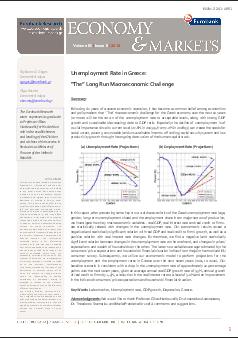Mitchell, B. (2014) “Greece – return to growth demonstrates the role of substantial fiscal deficits“, Bill Mitchell Blog: Modern Macroeconomic Theory – Macroeconomic Reality, 19 Νοεμβρίου. We had news this week that the annual rate of real GDP growth in Greece is finally positive after two quarters of positive growth. The austerity merchants are out in force congratulating themselves on a victory. Some victory. What the official data doesn’t …Read More
Lower levels of clientelism in Portuguese politics explain why Portugal handled austerity better than Greece during the crisis
Afonso, A., Zartaloudis, S. & Papadopoulos, Y. (2014) “Lower levels of clientelism in Portuguese politics explain why Portugal handled austerity better than Greece during the crisis“, LSE EUROPP, 27 Οκτωβρίου. Greece and Portugal were two of the worst hit countries by the Eurozone crisis, yet the domestic political reaction within each state was notably different. While in Greece there were difficulties agreeing to austerity policies and the party system …Read More
Unemployment Rate in Greece: “The” Long Run Macroeconomic Challenge
Gogos, S. & Kosma, O. (2014) “Unemployment Rate in Greece: “The” Long Run Macroeconomic Challenge“, Eurobank Research Team, Economy and Markets, Vol. IX, Issue 6, Ιούνιος. Αποτελεί κοινή πεποίθηση, τόσο στην οικονομολογική κοινότητα όσο και στους ασκούντες την οικονομική πολιτική, ότι η πρόκληση για την ελληνική οικονομία κατά την διάρκεια των επόμενων δέκα ετών θα είναι η ταχεία μείωση του ποσοστού ανεργίας σε επίπεδα που να προσεγγίζουν τον μέσο …Read More
DG ECFIN And The Missing Greek Exports
Janssen, Ρ. (2014) “DG ECFIN And The Missing Greek Exports“, Social Europe Journal, 02 Ιουλίου. Economists at DG ECFIN are starting to notice something we have pointed out already some time ago: Despite an enormous cut in wage costs, Greek exports have firmly stayed put in recessionary territory and hopes for an export-led recovery have proven to be illusive. Troubled by this failure of Greek exports to lift off, DG …Read More
Greece Taps The Market
Horne, J. P. (2014) “Greece Taps The Market“, The European Institute. The Greek government borrowed on the international bond market last week, the first time in over four years.[1] The bond issue comes just five years after Greece’s severe economic and financial crisis had become an existential threat to the euro itself. The fact that Greece was able to borrow €3 billion for five years at 4.75%, with orders …Read More
Is Deflation a Risk for Greece?
Anastasatos, T. & Stamatiou, T. (2014) “Is Deflation a Risk for Greece?”, Economy and Markets, Eurobank Research, Vol. IX, Issue 3, Απρίλιος. Deflation is the occurrence of negative inflation, i.e. the situation in which prices of goods and services are falling in an economy. By contrast, disinflation is a slow-down in the inflation rate. In technical terms, deflation is considered to have occurred when CPI or the GDP deflator …Read More
Διακυβέρνηση του ΕΣΠΑ και δημόσιες πολιτικές στην Ελλάδα
Ανδρέου, Γ. (2014) “Διακυβέρνηση του ΕΣΠΑ και δημόσιες πολιτικές στην Ελλάδα“, South and East European Development Center, 5 Απριλίου. Αντικείμενο της εισήγησης είναι η μελέτη των αλληλεπιδράσεων ανάμεσα στις υφιστάμενες προτεραιότητες πολιτικής της Ελλάδας και στη διαδικασία προγραμματισμού για τη νέα πολιτική συνοχής στην Ελλάδα (2014-2020). Υπό το πρίσμα αυτό, αναπτύσσονται δύο άξονες προβληματισμού. Πρώτον, αξιολογείται η επιχειρησιακή προστιθέμενη αξία αυτής καθεαυτής της διαδικασίας προγραμματισμού. Με άλλα λόγια, επιχειρείται …Read More
The Greek Crisis: Origins and Implications
Galenianos, M. (2014) “The Greek Crisis: Origins and Implications“, Greek Economists for Reform.com, 07 Απριλίου. This paper argues that the deep causes of the Greek and Eurozone crisis are the large external imbalances (trade deficits) of the countries of the European periphery. Their fiscal imbalances exacerbated but did not cause the crisis and therefore fiscal adjustment is a necessary but not sufficient condition for economic recovery. For their economies …Read More
Implementation of the Macroeconomic Adjustment Programmes in the Euro Area: State-of-Play
Gros, D., Alcidi, C., Belke, A. Coutinho, L. & Giovannini, A. (2014) “Implementation of the Macroeconomic Adjustment Programmes in the Euro Area: State-of-Play“, Economic Policy, CEPS Paperbacks, 11 Μαρτίου. Two of the four macroeconomic adjustment programmes – in Portugal and Ireland – can be considered a success in the sense that the initial expectations in terms of adjustment, both fiscal and external, were broadly fulfilled. A rebound based on …Read More
Latvia and Greece: Less is More
Biggs, M. & Mayer, T. (2014) “Latvia and Greece: Less is More“, Economic Policy, CEPS High-Briefs, 12 Φεβρουαρίου 2014 Key Points: Despite considerable differences, there were also many similarities in economic performance between Latvia and Greece before their respective adjustment crises. After the immediate crisis, however, economic activity rebounded sharply in Latvia but continued to contract in Greece. This paper argues that this difference was due primarily to developments in …Read More





